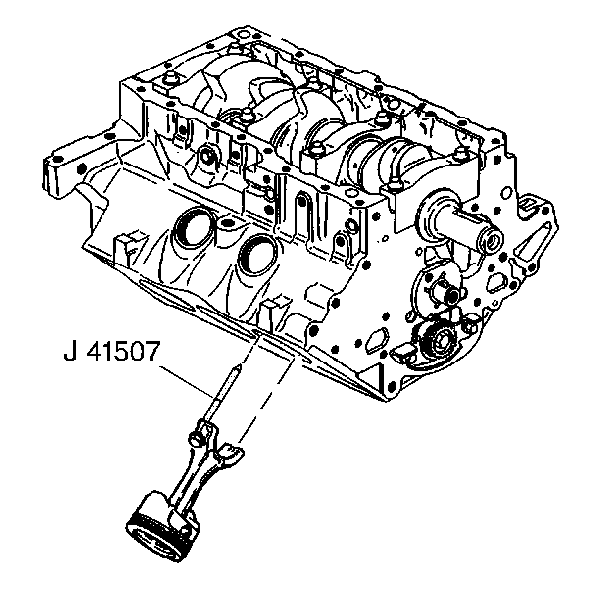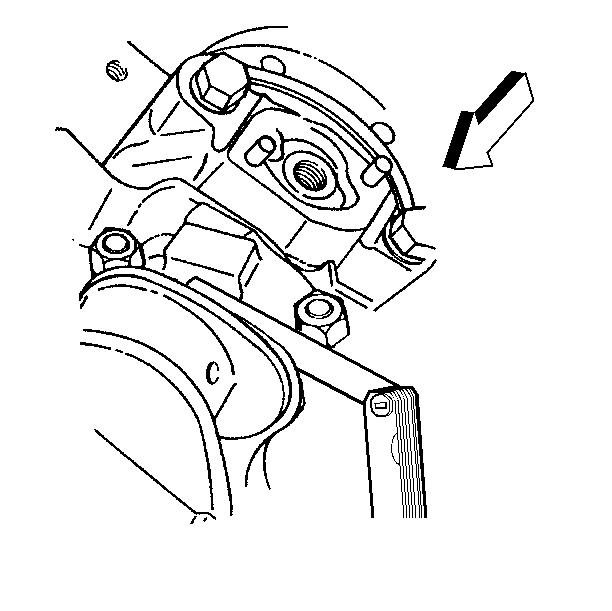Removal Procedure
Tools Required
- Remove the cylinder head. Refer to Cylinder Head Replacement or Cylinder Head Replacement .
- Remove the oil pan. Refer to Oil Pan Replacement .
- Mark the piston with the number of the cylinder from which it is being removed.
- Mark the connecting rod and the rod cap so that they can be assembled correctly.
- Turn the crankshaft to bottom dead center.
- Clean the carbon from the top end of the cylinder.
- Remove the connecting rod bolts.
- Remove the connecting rod cap.
- Install the J 41507 on the connecting rod.
- Remove the connecting rod and piston. Push out with a suitable tool.

Notice: If there is a pronounced ridge at the top of the piston travel, the ridge must be removed with a ridge reamer before the piston and connecting rod assembly are removed. Applying force may break the piston rings or damage the piston.
Caution: Handle the piston carefully. Worn piston rings are sharp and may cause bodily injury.
Important: Do not use force when removing the connecting rod and piston. Avoid breaking the piston rings and damaging the piston.
Installation Procedure
- Install the piston rings to the piston. The ring gaps must be staggered in order to provide an effective compression seal.
- Turn the crankshaft to bottom dead center.
- Lubricate the cylinder with oil.
- Install the connecting rod bearing.
- Install the J 41507 on the connecting rod.
- Align the piston and the connecting rod with the ridges toward the front of the engine.
- Install the piston and connecting rod using a ring compressor.
- Install the bearing inserts to a clean and dry connecting rod and cap.
- Measure the rod bearing clearance. If the readings are within limits, select a suitable set of inserts. If the readings are unsatisfactory and available inserts will not correct the clearance, the crankshaft must be replaced.
- Lubricate the bearing surfaces and the crankshaft journal surfaces with clean engine oil.
- Remove the J 41507 .
- Install the connecting rod cap.
- Install the connecting rod cap bolts.
- Pry the connecting rod back and forth with a suitable tool and check for binding. If necessary, loosen and retighten the bearing cap.
- Measure the connecting rod side clearance.
- Install the oil pan. Refer to Oil Pan Replacement .
- Install the cylinder head. Refer to Cylinder Head Replacement or Cylinder Head Replacement .

Notice: Guide the lower connecting rod end carefully to avoid damaging the crankshaft journal.
Notice: Do not scrape, shim, or file bearing inserts. If the bearing surface of the insert is touched with bare fingers, the skin oil and acids will etch the bearing surface.
Notice: Upper and lower inserts may be different. Do not obstruct any oil passages.
Important: Ensure that the bearing cap bolt holes and the cap mating surfaces are clean and dry. The inserts will project slightly when put into place. Ensure that they project an equal distance on both sides. Ensure that the insert tangs are engaged.
Important: Carefully tap the bearing cap into place. Do not pull the cap down with the cap bolts.
Tighten
Tighten the bolts to 27 N·m (20 lb ft). Use
the J 36660-A
in order to
rotate the bolts an additional 50°.

